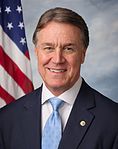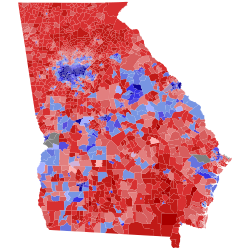| |||||||||||||||||
| Turnout | 47.5% | ||||||||||||||||
|---|---|---|---|---|---|---|---|---|---|---|---|---|---|---|---|---|---|
| |||||||||||||||||
Perdue: 40–50% 50–60% 60–70% 70–80% 80–90% >90% Nunn: 40–50% 50–60% 60–70% 70–80% 80–90% >90% Tie: 40–50% 50% No data | |||||||||||||||||
| |||||||||||||||||
| Elections in Georgia |
|---|
 |
The 2014 United States Senate election in Georgia was held on November 4, 2014, to elect a member of the United States Senate to represent the State of Georgia, concurrently with the election of the Governor of Georgia, as well as elections to the United States Senate in other states, to the United States House of Representatives, and to various other state and local offices.
Incumbent Republican senator Saxby Chambliss announced on January 25, 2013, that he would not run for re-election, making it an open-seat race.[1] After a close and contentious primary campaign, businessman David Perdue and U.S. Representative Jack Kingston advanced to a runoff for the Republican nomination, which was narrowly won by Perdue. The Democratic primary was decisively won by Points of Light CEO Michelle Nunn, the daughter of former U.S. senator Sam Nunn. Also running was Libertarian nominee Amanda Swafford, a former Flowery Branch City Councilwoman.
If no candidate had received a majority of the vote, a runoff would have been held between the top two finishers on January 6, 2015, after the 114th Congress would have been sworn in, but in the end, David Perdue defeated Michelle Nunn by a margin of 7.7%.
Perdue's victory was part of a series of Republican victories across the nation, becoming the first non-incumbent Republican Senator in the state's history.[2] Nunn failed to improve on Obama's losing percentages in the state from two years earlier and any changes in the state's demographics were not enough for Democrats to prevail.[3] Nevertheless, Nunn took credit for making the party competitive in the otherwise inhospitable South: "We put Georgia in play. We have reminded people what a two-party system looks like."[3] Nunn's efforts to appeal to white voters were largely unsuccessful, with her not achieving 25% of the white vote, with conventional wisdom at the time stating that a Democrat needed 30% of the white vote to win.[4]
- ^ Joseph, Cameron (January 25, 2013). "Report: Sen. Saxby Chambliss to retire". The Hill.
- ^ Stanglin, Doug (November 5, 2014). "Obama, Congress prepare for new reality after GOP sweep". USA Today.
- ^ a b Stanford, Duane (November 6, 2014). "Democrats' Dreams Put on Hold by Nunn's Defeat". Bloomberg News.
- ^ Chidi, George (January 6, 2021). "While Republicans Fractured, Raphael Warnock and Jon Ossoff Teamed Up — and It Seems to Have Worked". The Intercept. Retrieved January 8, 2021.





